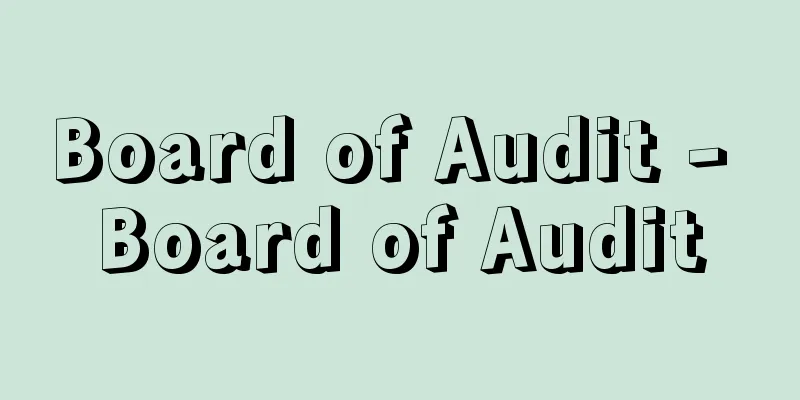Board of Audit - Board of Audit

|
A national organization that monitors and audits the execution of national finances. Audits have a long history, and Aristotle's Politics, for example, describes the audit system of the polis at that time. The constitutional provisions regarding the Board of Audit of Japan are found in Article 90, and its organization and authority are stipulated in the Board of Audit Law (Law No. 73 of 1947). Under the Meiji Constitution, it was an organization directly under the Emperor, but now it is an independent organization consisting of a Board of Auditors consisting of three auditors and a General Secretariat, and has a status independent of the Cabinet. The Board of Auditors audits the accounts and submits an audit report to the Diet through the Cabinet. In order to guarantee the independence of the Board of Audit, the current law guarantees the status of the auditors and grants them the right to autonomous legislation (the right to make rules) regarding the Board, the right to express opinions regarding the Board of Audit budget, and the right to explain the report in the Diet. In addition, the action taken by the Board of Audit to determine the liability of the national accounting and property management officials to the state is called an examination. When a national budget execution official intentionally or with gross negligence commits an expenditure or other act in violation of laws and regulations, when a national accounting official loses cash by failing to exercise the due care of a good manager, and when a national property management official intentionally or with gross negligence manages property in violation of the provisions of the Property Management Act or fails to manage property in accordance with the provisions of said Act, resulting in the loss or damage of property or other damage to the State, the Board of Audit examines whether such fact has caused damage to the State and determines whether there is a liability for compensation (Board of Audit Act, Article 32). Source: Encyclopaedia Britannica Concise Encyclopedia About Encyclopaedia Britannica Concise Encyclopedia Information |
|
国家財政の執行を監視し検査する国家機関。会計検査の歴史は古く,たとえばアリストテレスの『政治学』にも当時のポリスの会計検査制度に関する叙述がみられる。日本の会計検査院に関する憲法上の規定は第 90条にあり,その組織および権限については会計検査院法 (昭和 22年法律 73号) で定められている。明治憲法下では天皇の直属機関であったが,現在は3人の検査官をもって組織する検査官会議と事務総局から成る独立機関として,内閣から独立した地位を有している。検査官会議は決算を検査し,検査報告書を内閣を通じて国会に提出する。会計検査院の独立を保障するため,現行法では検査官の身分は保障され,院に関する自主立法権 (規則制定権) ,検査院予算に関する意見陳述権,国会における報告書の説明権を認めている。また,国の会計事務職員および物品管理職員の国に対する弁償責任を決定するために,会計検査院が行う処分を検定という。会計検査院は,国の予算執行職員が,故意または重大な過失により法令などに違反して支出などの行為をしたとき,国の出納職員が善良な管理者の注意を怠って現金を亡失したとき,および国の物品管理職員が故意または重大な過失により物品管理法の規定に違反して物品の管理行為をしたことまたは同法の規定に従った物品の管理行為をしなかったことにより物品を亡失し,または損傷し,その他国に損害を与えたときは,これにより国に損害を与えた事実があるかどうかを審理し,その弁償責任の有無を検定する (会計検査院法 32) 。
出典 ブリタニカ国際大百科事典 小項目事典ブリタニカ国際大百科事典 小項目事典について 情報 |
>>: Accounting audit - kaikeikensa
Recommend
Outbreak - Daihassei
A sudden increase in the population of living orga...
Santaro Goe - Santaro Goe
A collective term for Akamatsu Taro Pass, Sashiki ...
Character art - Mojie
A pictorial representation using characters. The ...
Consumerism - Consumerism
Consumerism. Refers to the claims and movements t...
Large coin
A traditional Korean transverse flute. Modern daes...
Merger processing - Gappei Shori
… [Types of sewerage] Japan's sewerage system...
'Abd Allāh b.Husayn
1882‐1951 The first king of Jordan. Second son of ...
Kameido Incident
Taking advantage of the chaos caused by the Great...
Connect
…Animal cells are covered with collagen, fibronec...
Steel - Leather
An intermediate product produced during the refini...
Food policy
It is a general term for policies related to food ...
Mato Grosso do Sul (English spelling) MatoGrossodoSul
...Cuiaba, the capital. In the past, the state st...
"Encouragement of Learning" - Kankakuhen
…In 1896, 13 Chinese students arrived in Japan fo...
Antonov's Rebellion - Antonovshchina
A large-scale anti-Soviet peasant revolt that took...
Unjo-kata
〘Noun〙 A subdivision of the accounting department ...

![Mito [city] - Mito](/upload/images/67ccf331e7282.webp)

![Akagi [town] - Akagi](/upload/images/67cad0781b187.webp)





